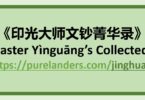
《佛说八大人觉经》
[The] Sūtra [In Which The] Buddha Speaks [Of] Eight Great Beings’ Realisations
后汉安息国三藏安世高译
[By] Later Hàn [Dynasty’s] Parthia Country’s Tripiṭaka [Dharma Master] Ān Shìgāo Translated
《佛说八大人觉经略解》
[The] Sūtra [In Which The] Buddha Speaks [Of] Eight Great Beings’ Realisations’ Brief Explanation
净土宗九祖蕅益大师解
[By The] Pure Land Tradition’s Ninth Patriarch Great Master Ǒuyì Explained
公元 2019 年优婆塞沈时安英译
[In] 2019 C.E [By] Upāsakā Shen Shi’an Translated [To] English
[For ease of detailed studying and editing, square brackets show necessary connective words used in translation, to be removed for final published version later, with addition of glossary and notes. Suggestions are welcome for more precise choice of words. Námó Āmítuófó.]
【解】:大文为三:初总标,二别明,三结叹。今初:
[Explanation]: [The] great text [is] with three [sections]. First [is the] general title. Second [are the] separate explanations. Third [is the] conclusion [with] praise. This [is the] first [section].
【经】:为佛弟子,常于昼夜,至心诵念,八大人觉:
[Sūtra]: As [the] Buddha’s disciples, [they should] constantly in day [and] night, [with utmost] sincere minds, recite [these] eight Great Beings’ realisations.
[Note 1: ‘常’ can also be translated as ‘frequent’ or ‘often’. These Great Beings’ realisations are to remind their reciters to align with them as much as possible in practice, for progress towards realising them, to become Great Beings too. For Pure Land practitioners, as with other optional practices, recitation of them can be a Supportive Practice (助行) added to the Main Practice (正行) of sincere mindfulness of Amitābha Buddha’s name (i.e. 阿弥陀佛: Āmítuófó), once in the morning and once in the evening.
Note 2: ‘Great Beings’ is short for ‘Bodhisattva Mahāsattvas’ (菩萨摩诃萨), with ‘Mahāsattvas’ meaning ‘Great Beings’, who are at least Seventh Ground (七地) Bodhisattvas. These are Great Bodhisattvas who are able to combine great compassion (大悲) with great wisdom (大智) to give rise to great skilful means (大方便) to guide all beings to Buddhahood.
Note 3: All who have reached Pure Land will become at least Eighth Ground (八地) Bodhisattvas, who exceed the most minor Bodhisattva Mahāsattvas. Even those who are already the greatest Bodhisattva Mahāsattvas aspire to reach Pure Land, to most swiftly expedite their progress towards Buddhahood.]
【解】:不论在家出家,但是归依于佛,即「为佛」之「弟子」。既为佛子,即应恒修此八种觉。
[Explanation]: Regardless [of those] at home [or having] left [the] household [life], only [those who have] taken refuge in [the] Buddha, [are] then ‘as [the] Buddha’s disciples’. Since as [the] Buddha’s disciples, then should [they] constantly cultivate these eight kinds [of] realisations.
言「常于昼夜」者,明其功无间断。
Speaking [of] that [of] ‘constantly in day [and] night’, [this] explains their efforts [to be] without interruption.
言「至心」者,明其亲切真诚。
Speaking [of] that [of ‘utmost] sincere minds’, [this] explains their closeness [with] sincerity.
言「诵念」者,明其文义淳熟,记忆不忘也。
Speaking [of] that [of] ‘recite’, [this] explains [being with] this text’s meanings proficient [and] familiar, remembering [and] not forgetting [them].
「八大人觉」,释现结叹文中。
[The] ‘eight Great Beings’ realisations’ [are] explained then, [in the] conclusion [with] praise’s text within.
二别明即为八。
[The] second [section with] separate explanations [are] then with eight [realisations].

初无常无我觉。
First [is] realisation [of] impermanence [and] non-self.
【经】:第一觉悟:世间无常,国土危脆;
[Sūtra]: [The] First Realisation: [The] world [is] impermanent, [and] homelands [are] dangerously fragile.
[Note 4: This world in terms of the earth will cosmically break apart and disintegrate eventually, although not so soon, for billions of years at least. Before that, countries are subject to human-made disasters (such as wars and pandemics) and natural disasters that endanger life, although even natural disasters (such as the climate crisis) that affect humans are due to their negative actions’ karma, thus also human-made. As such, where we live now, which might seem stable, is no safe and lasting refuge, in this and future lives. In contrast, Pure Land is the Land Of Peace And Bliss (安乐国), always free from all disasters.]
四大苦空,五阴无我;生灭变异,虚伪无主;
[The] Four Great [Elements are of] suffering [and] emptiness, [and the] Five Aggregates [are] without self. [With] arising [and] ceasing changing [to be] different, [they are] false, fake [and] without [a] host.
[Note 5: The Four Great Elements (地水火风) are the key constituents of matter (and the environment), which are earth (which represents solidity), water (which represents cohesion), fire (which represents energy) and wind (which represents expansion). They condition suffering if clung to, as they are empty of lasting nature. In Pure Land, both the environment and our bodies will be of the most refined forms, thus not leading to suffering; only with bliss.
Note 6: The Five Aggregates are form (which comprises of the Four Great Elements), feelings, perceptions, mental formations and consciousness (色受想行识), which constitute sentient beings like humans. The second to fifth aggregates are constituents of the mind.
Note 7: The Five Aggregates are without any permanent self as there is no unchanging or substantial element within fully capable of willing how the aggregates should be. ‘无主’ can also be translated as ‘without a master’, in terms of being without a true self within the aggregates in control. This is while the ‘true self’ is beyond the aggregates of mind and matter, as Buddha-nature (佛性), the potential for Buddhahood. In Pure Land, our Buddha-nature will be most swiftly realised.]
心是恶源,形为罪薮(sǒu)。
[The] mind is evil’s source, [and the] body as transgressions’ gathering place.
[Note 8: The Three Poisons (三毒) of attachment (greed), aversion (hatred) and delusion (ignorance) (贪嗔痴) within the mind is the cause of evil and suffering. The body is transgressions’ gathering place as it is with it that transgressions are made and where its effects are experienced. In Pure Land, our minds will be naturally conditioned to only be good and pure, just as our bodies will only be vehicles for goodness and purification.]
如是观察,渐离生死。
Thus observing, gradually depart [from the cycle of] births [and] deaths.
[Note 9: The swiftest way to depart from the cycle of births and deaths is to reach Pure Land, which can be done, even before fully observing to realise the above in this lifetime. In Pure Land, the above will be able to be observed and realised most swiftly too.]
【解】:此入道之初门,破我法执之前阵也。先观「世间无常,国土危脆」,如高岸为谷,深谷为陵等,则于依报无可贪著。
[Explanation]: This first door of entering [the] path, [is the] advance army for breaking self’s [and] dharmas’ attachments. First contemplate [that ‘the] world [is] impermanent, [and] homelands [are] dangerously fragile’, like high banks becoming valleys, deep valleys becoming mounds [and] others, then of circumstantial rewards without [that which] can [be] greedily attached [to].
[Note 10: With breaking of self attachment (我执) is self-liberation, to be Arhats. With breaking of dharmas’ attachment (法执) too is complete liberation, that is able to help liberate others completely too, to be Buddhas.
Note 11: Circumstantial rewards (or retribution) (依报) refer to the environmental attributes that are positive (or negative), that karmically manifest around one. They include available clothing, food, shelter and transport (衣食住行) and more.]
次以「四大」观身。地水火风互相陵害,故有四百四病之「苦」。各无实性故,究竟皆「空」。
Next, with [the] ‘four great [elements]’, contemplate [the] body. [With] earth, water, fire [and] wind bullying [and] harming one another, thus having ‘suffering’ of four hundred [kinds of] four sicknesses. Each [being] without true nature thus, ultimately all [are of] ’emptiness’.
[Note 12: When the four great elements are unbalanced, with one or more overpowering the others, they give rise to sicknesses with hundreds of possible combinations. As basic examples, when the earth element is too strong, there are problems related to obesity. When the water element is too strong, there are problems related to water retention. When the fire element is too strong, there are problems related to fevers. When the wind element is too strong, there are problems related to colds.]
次以四阴观「心」。所谓受想行识,并此色身,共名「五阴」。于中实「无我」及我所,但是「生灭」之法,刹那刹那迁「变」转「异」。不实故「虚」,非真故「伪」,递相乘代故「无主」。则于正报无可贪著。
Next, with [the] four aggregates, contemplate [the] ‘mind’. So-called feelings, perceptions, mental formations [and] consciousness, combining [with] this form body, [are] together named [the] ‘Five Aggregates’. Of [them] within truly ‘without self’ and that [of] self, only [with] ‘arising [and] ceasing’ [of] dharmas, [from] kṣaṇa [to] kṣaṇa ‘changing’, transforming [to be] ‘different’. Not true, thus ‘false’, not real thus ‘fake’, alternating, subjugating [and] replacing one another, thus ‘without [a] host’, then of direct retribution without [that which] can [be] greedily attached [to].
[Note 13: The so-called self is but an illusion sustained by the quickly rising and falling phenomena (dharmas: 法) of mind and matter, from moment (kṣaṇa: 刹那) to moment.
Note 14: Direct retribution (or reward) (正报) refers to the physical and mental attributes that are negative (or positive), that karmically manifest upon oneself. They include available appearance, family members, birth status and more.]
又此正报身心,不惟空爱惜之,于事无益,而且一迷六尘缘影为自心相,则「心」便为众「恶」之「源」;一迷四大为自身相,则「形」便「为」众「罪」之「薮」。
Moreover, [with] this direct retribution body [and] mind, not only [is] empty cherishing of [them], of [this] matter without benefit, moreover, once confused, [with the] six dusts’ conditions’ images as one’s mind’s form, then [is the] ‘mind’, then as [the] ‘source’ of all ‘evils’. Once confused, [with the] four great [elements] as one’s body’s form, then [is the] ‘body’, then ‘as’ [the] ‘gathering place’ of all ‘transgressions’.
[Note 15: We should take reasonable care of our body and mind, but without attachment to them. They are but vehicles that allow us to learn and practise the Dharma, to be liberated from them.
Note 16: The six dusts (六尘) refer to environmental attributes experienced as sights, sounds, smells, tastes, touches and thoughts (色声香味触法).]
倘不直下覤破,害安有极。若能「如是观察」,则身心二执渐轻,即「渐离生死」之第一方便也。
If not directly hastening [with] terror, [to] break [these attachments, they are with] harm [of] peace having [the] extreme. If able [to be] ‘thus observing’, then [of the] body [and] mind, [with these] two attachments gradually lightened, then [is to] ‘gradually depart [from the cycle of] births [and] deaths’, [as the] foremost of skilful means.

二常修少欲觉。
Second [is] realisation [of] constant cultivation [of] less desires.
【经】:第二觉知:多欲为苦,生死疲劳,从贪欲起;
[Sūtra]: [The] Second Realisation: [With] many desires is suffering, [as the cycle of] births’ [and] deaths’ weariness, from greedy desires arises.
[Note 17: The more greedy worldly desires there are, the more weary suffering there will be in more cycles of births and deaths.]
少欲无为,身心自在。
[With] less desires, [becoming] unconditioned, [is with the] body [and] mind [at] ease.
[Note 18: The key spiritual desire, or rather, Aspiration (or vow: 愿), that Pure Land practitioners should have is to reach Pure Land. Ease is attained with more peace of mind, when less conditioned by the wish to fulfil endless worldly desires.
Note 19: Only the completely unconditioned are completely liberated. ‘无为’ can also mean ‘non-doing’, to let worldly matters take their own courses naturally. This is more easily done when there are less worldly desires. Of course, on the Bodhisattva path powered by spiritual aspirations, this does not mean to do nothing, to let evil proliferate, when one should do what can be done to prevent this, for the sake of other beings.]
【解】:此既以第一觉降伏见惑。次以第二觉降伏思惑也。思惑虽多,欲贪为首。能修「少欲」,则可以悟「无为」而得「自在」矣!
[Explanation]: This [is] already with [the] first realisation [for] subduing confused views. Next [is] with [this] second realisation [for] subduing confused thoughts. Confused thoughts although many, [are with] sensual desires as [their] leader. [If] able [to] cultivate ‘less desires’, then can [there be] with awakening [to the] ‘unconditioned’, [to] then attain ‘ease’!

三知足守道觉。
Third [is] realisation [of] knowing contentment [and] guarding [of the] path.
【经】:第三觉知:心无厌足,唯得多求,增长罪恶;
[Sūtra]: [The] Third Realisation: [With the] mind without satisfaction, only [wanting] attaining [of] much sought, [this] increases [and] grows transgressions [and] evil.
[Note 20: As long as dissatisfied, while greedy for more of the worldly, with this greed continually expressed, there will be more transgressions created.]
菩萨不尔,常念知足,安贫守道,唯慧是业。
Bodhisattvas [are] not thus, [being] constantly mindful [of] knowing contentment, peaceful [with] simple [lives], guarding [the] path, only [with seeking] wisdom as [their] karmic [conditions].
[Note 21: Once with contentment, there will be enough. Without contentment, there will never be enough. While there should be contentment in the worldly sense, there should still be diligence in the spiritual sense. If content with the cycle of births and deaths, Pure Land and liberation will never be reached.]
【解】:此既修少欲,复修「知足」,以专心于慧业也。多欲不「知足」人,最能障慧。今于少欲之中,又复「知足」,则慧业任运可进矣!
[Explanation]: This [is] already [with] cultivating [of] less desires, again cultivating ‘knowing [of] contentment’, with [the] focused mind on wisdom’s karmic [conditions]. Persons [with] many desires [who do] not ‘know contentment’, [are with that] most able [to] obstruct wisdom. Now with less desires within, also again ‘knowing contentment’, then [with] wisdom’s karmic [conditions] accomplished naturally, can [there be] advancement!

四常行精进觉。
Fourth [is] realisation [of] constant practice [with] diligence.
【经】:第四觉知:懈怠坠落;
[Sūtra]: [The] Fourth Realisation: [With] laziness [comes] falling.
[Note 22: Complacence and arrogance, that lead to slackness, comes before the fall. This is true both in the worldly and spiritual sense.]
常行精进,破烦恼恶,摧伏四魔,出阴界狱。
[With] constant practice diligent, break afflictions [and] evil, subdue [the] Four Demons, [and] exit [the] aggregates’ realms’ prison.
[Note 23: The Four Demons are afflictions’ demons (烦恼魔), aggregates’ demons (阴魔), death demon (死魔) and (With Others’ Transformations Having) Ease (i.e. Paranirmita-Vaśavartin) Heaven’s [Māra] Demons ([他化]自在天魔).]
【解】:夫所谓少欲知足者,正欲省其精力以办出要耳!倘托言知足,而反坐在「懈怠」坑中,则「坠落」不浅矣!故必「常行精进」,以「破」见思「烦恼」。「烦恼」之魔」既破,则阴「魔」、天「魔」、死「魔」皆悉「摧伏」,而五「阴」十八「界狱」乃可「出」也。
[Explanation]: Those so-called [with] less desires knowing contentment, exactly desiring [to] save their energy, [are] with managing [of] exit’s essentials only! If relying on [this] said knowing contentment, yet instead sitting in ‘laziness’ pit within, then [is there] ‘falling’ [into that] not shallow! Thus must [there be with] ‘constant practice diligent’, with ‘break’ing [of mistaken] views’ [and] thoughts’ ‘afflictions’. [With] ‘demons’ of ‘afflictions’ already broken, then [are] aggregates’ ‘demons’, heavenly ‘demons’, [and] death’s ‘demon’ all ‘subdued’, then [of the] Five ‘Aggregates’ [and the] Eighteen ‘Realms’ prison’, thus can [they be] ‘exited’.
[Note 24: ‘Falling [into that] not shallow’ can refer to descent into the three lower realms of animals (畜生), hungry ghosts (饿鬼) and hell-beings (地狱众生).
Note 25: The ‘Eighteen Realms’ refer to the six realms of the Six Roots (六根) of eye, ear, nose, tongue, body and mind (眼耳鼻舌身意), the six realms of the Six Objects (六境) of sight, sound, smell, taste, touch and thought (色声香味触法), and the six realms of the Six Consciousnesses (六识) of eye consciousness (眼识), ear consciousness (耳识), nose consciousness (鼻识), tongue consciousness (舌识), body consciousness (身识) and mind consciousness (意识). To be free from their prison is to be liberated.]

五多闻智慧觉。
Fifth [is] realisation [of] much listening [for] wisdom.
【经】:第五觉悟:愚痴生死。
[Sūtra]: [The] Fifth Realisation: [With] ignorance [is the cycle of] births [and] deaths.
[Note 26: Being ignorant of the cause of the cycle of births and deaths as the Three Poisons perpetuates rebirth.]
菩萨常念,广学多闻,增长智慧,成就辩才,教化一切,悉以大乐。
Bodhisattvas [are] constantly mindful, widely learning [with] much listening, [to] increase [and] grow wisdom, [and] accomplish eloquence, [for] teaching [and] transforming all [beings, to] all [be] with great bliss.
[Note 27: Being always compassionate, Bodhisattvas continually strive to perfect their wisdom, and to best express it, to guide all others to the greatest bliss of Buddhahood, with the easiest method being through reaching of Pure Land.]
【解】:虽云精进,若不「广学多闻,增长智慧」,则成暗证之愆。又有闻无慧,如把火自烧;有慧无闻,如执刀自割。闻慧具足,方可自利利他。
[Explanation]: Although having diligence, if not ‘widely learning [with] much listening, [to] increase [and] grow wisdom’, then becoming [the] transgression of [having] obscured ‘realisation’. Also, having listening without wisdom, [is] like using fire [to be] self-burnt, like holding [a] knife [to be] self-cut. [With] listening [and] wisdom complete, then can [there be] self-benefitting [and] benefitting [of] others.

六布施平等觉。
Sixth [is] realisation [of] giving equally.
【经】:第六觉知:贫苦多怨,横结恶缘。
[Sūtra]: [The] Sixth Realisation: [With] poverty’s suffering [are] many grudges, [that] pervasively form evil affinities.
[Note 28: It is natural that those who are poor and suffering, if not wise enough, easily give rise to resentment and blame of others who are doing better. This can even lead to transgressions and crimes due to the Three Poisons, thus creating enemies.]
菩萨布施,等念怨亲,不念旧恶,不憎恶人。
Bodhisattvas [practise] generosity, equally mindful [of] enemies [and] relatives, not mindful [of] old grievances, not hating evil persons.
[Note 29: Even if poor, there should be at least some practice of generosity within one’s means. This helps others who are poor and suffering, to have less grudges, thus forming good affinities, for transforming them. Personal generosity is also the karmic remedy for the problem of personal poverty. Generosity should be equanimous, impartial of those with whom one has good or evil affinities with. Upon reaching Pure Land, there will naturally be perfect equanimity for all.]
【解】:虽有智慧,而无福德,亦不可以自利利他,故须具行三檀也。知「贫苦」之「多怨」,而行「布施」,即财施也。知怨亲之平等,而「不念」「不憎」,即无畏施也。法施已于上文明之。今以财及无畏,圆满三檀耳。
[Explanation]: Although having wisdom, yet without blessed virtues, likewise cannot [be] with self-benefitting [and] benefitting [of] others, thus needing [to be] complete [with] practice [of the] Three Generosities. Knowing [the] ‘many grudges’ of ‘poverty’s suffering’, then practising ‘generosity’, then [is with] wealth giving. Knowing equality [of] enemies [and] relatives, yet not [with] affection [and] not [with] hatred, then [is with] fearlessness giving. [With the] Dharma giving [is] already in [the] above text, [with] it clear. Now with wealth and fearlessness, perfecting [and completing the] Three Generosities.

七出家梵行觉。
Seventh [is] realisation [of] leaving [the] household [life to have] pure practices.
【经】:第七觉悟:五欲过患。
[Sūtra]: [The] Seventh Realisation: [With the] Five Desires [are] faults [and] suffering.
[Note 30: The Five Desires are for wealth, sex, fame, food and sleep (财色名食睡). Being aspects of greed, they lead to suffering in this life (and life after life) when they are clung to, while those desired for are not lasting, even when obtained.]
虽为俗人,不染世乐;
Although with common people, [do] not [be] stained [by] worldly joy.
[Note 31: Even as ordinary beings, we should practise not being tainted by attachment to ever-fleeting worldly pleasures. Otherwise, we will always be worldly beings, with no advancement towards liberation.]
念三衣,瓶鉢法器;志愿出家,守道清白;梵行高远,慈悲一切。
[Be] mindful [of the] Three Robes, bottle, alms bowl [and] Dharma instruments. [Have the] aspiration [to] leave [the] household [life, to] guard [the] path’s purity, [with] pure practices high [and] far[-reaching, with] loving-kindness [and] compassion [for] all.
[Note 32: ‘高远’ can also be translated as ‘lofty’. Even lay Buddhists should aim to lessen and eradicate the Five Desires in good time, and even aspire to become monastics, in this life or the next. If not possible in this life, this can easily be fulfilled by aspiring to reach Pure Land by the end of this life, where the Five Desires will be eradicated, and where there will be all pure practices accomplished perfectly. There, even the loftiest aspirations will be able to be accomplished.]
【解】:虽修智慧福德,若不永离居家「五欲」,终不可以绍隆僧宝,住持佛法。当知三世诸佛,无有不示「出家」而成道者也。「三衣」:一安陀会,二优多罗僧,三僧伽梨也。然使身虽出家,而不能「守道清白,梵行高远,慈悲一切」,则为窃佛形仪,罪加一等,不可不知。
[Explanation]: Although cultivating wisdom [and] blessed virtues, if not forever departing [from] living [at] home’s ‘Five Desires’, [one in the] end cannot [be] with continuation [of] development [of the] Saṃgha gem, [to] uphold [the] Buddha’s Dharma. [It] should [be] known [that the] three periods’ all Buddhas, [are] without those [who did] not manifest ‘leaving [of the] household [life’ to] accomplish [the] path. [The] ‘Three Robes’ [are], first, [the] Antarvāsa [i.e. inner robe], second, [the] Uttarāsaṃga [i.e. upper robe], [and] third, [the] Saṃghāṭī [i.e. monastic robe]. Thus, if [with the] body although [having] left [the] household [life], yet not able [to] ‘guard [the] path’s purity, [with] pure practices high [and] far[-reaching, with] loving-kindness [and] compassion [for] all’, [it is] then with stealing [of the] Buddha’s appearance [and] bearing, [with] transgressions increased [by] one [more] degree. [This] cannot [be] not known.

八大心普济觉。
Eighth [is] realisation [of the] great mind [to] universally help.
【经】:第八觉知:生死炽然,苦恼无量。
[Sūtra]: [The] Eighth Realisation: [With the cycle of] births [and] deaths burning fiercely, [are] sufferings [and] afflictions immeasurable.
[Note 33: To reflect upon this in terms of oneself, is compassion for only oneself. To reflect upon this in terms of all other beings, is compassion for everyone else. The latter aids giving rise to Bodhicitta. (See Note 34.)]
发大乘心,普济一切;愿代众生,受无量苦;令诸众生,毕竟大乐。
Give rise [to the] Great Vehicle’s Mind, [to] universally help all, aspiring [to] replace sentient beings, [to] receive immeasurable suffering, enabling all sentient beings, [to attain] ultimate great bliss.
[Note 34: The ‘Great Vehicle’s Mind’ is ‘Bodhicitta’ (菩提心), the greatest spiritual aspiration, to guide oneself and all other beings to Buddhahood. It is possible to eradicate negative karma that causes suffering on the behalf of others to some extent if there is common collective karma. Even if it is karmically impossible for any one person to suffer for all beings completely, having this aspiration expresses and nurtures greater compassion in thought and deed.]
【解】:虽复出家,不发「大乘」「普济」之心,则慈心不周;不发「代众生」苦之心,则悲心不切。慈悲周切,方是绍佛家业之真子也。
[Explanation]: Although [having] left [the] household [life], not giving rise [to the] mind of [the] ‘Great Vehicle’ [to] ‘universally help’, then [is with] loving-kindness’ mind not thorough. Not giving rise [to the] mind of ‘replac[ing] sentient beings’ [to] suffer, then [is with] compassion’s mind not sincere. [With] loving-kindness [and] compassion thorough [and] sincere, then is continuation [of the] Buddha’s family’s deeds, [as] his true sons [and daughters] [i.e. disciples].
三结叹。
[The] third [section is the] conclusion [with] praise.

【经】:如此八事,乃是诸佛菩萨大人之所觉悟。
[Sūtra]: Thus, [of] these eight matters, [they] indeed are that [which] all Buddhas [and] Great Bodhisattva Beings realised.
[Note 35: ‘菩萨大人’ are ‘Bodhisattva Mahāsattvas’, who are also ‘Bodhisattva Great Beings’. The Buddhas can be considered as perfected ‘Bodhisattva Mahāsattvas’, thus transcending the term to be called Buddhas (佛陀), as completely awakened ones.]
精进行道,慈悲修慧,乘法身船,至涅槃岸;复还生死,度脱众生。
[They] diligently practise [the] path, [with] loving-kindness [and] compassion cultivating wisdom, riding [on the] Dharma body’s [i.e. Dharmakāya] ship, [having] reached Nirvāṇa’s shore, again return [to the cycle of] births [and] deaths, [to] deliver [and] liberate sentient beings.
[Note 36: Being Bodhisattva Mahāsattvas, they can easily connect to and ‘ride upon’ the Dharmakāya (法身), which is the universal body of all Buddhas, as the Dharma Body’s Great Beings (法身大士), who have attained at least the First Abode (初住) of Bodhisattvahood. Their return to the cycle of births and deaths would be as already liberated beings, able to manifest as great Bodhisattvas (or Buddhas), who are not personally subject to suffering, (even when manifesting so, as a skilful means to blend in with the masses to be helped). While it is very difficult for ordinary beings to reach Nirvāṇa directly, it is much easier to reach Pure Land first, where Nirvāṇa will be most swiftly realised. Those who return from Pure Land will be the Dharma Body’s Great Beings too.]
以前八事,开导一切,令诸众生,觉生死苦,舍离五欲,修心圣道。
With [the] preceding eight matters, [they] teach [and] guide all, enabling all sentient beings, [to] awaken [to the cycle of] births’ [and] deaths’ sufferings, renounce [and] depart [from the] Five Desires, [and] cultivate [the] mind [for the] noble path.
[Note 37: The swiftest and easiest way to become a Bodhisattva Mahāsattva capable of doing the above to benefit all other beings is via reaching and training in the best Dharma school available – in Pure Land.]
若佛弟子,诵此八事,于念念中,灭无量罪;进趣菩提,速登正觉;永断生死,常住快乐。
If [the] Buddha’s disciples, recite these eight matters, in thought [to] thought within, [they will] eradicate immeasurable transgressions, enter into Bodhi, swiftly ascend [to] Right Awakening, [and] forever sever [the cycle of] births [and] deaths, [to] constantly abide [in] happiness.
[Note 38: ‘Bodhi’ here refers to the ‘Right Awakening’ of Buddhahood. It should be noted that mindfulness of Āmítuófó’s name alone eradicates 80 koṭis (i.e. 10 million each) of kalpas’ (i.e. world cycles of about 1.3 trillion years each) births’ and deaths’ transgressions. In addition, the swiftest path to Right Awakening, which severs the cycle of births and deaths, to constantly abide in happiness, is by reaching his Pure Land.]
【解】:「如此八事」下十六字,结成名义。
[Explanation]: ‘Thus, [of] these eight matters’ [and] below’s sixteen words [i.e. till ‘… Great Bodhisattva Beings realised’], form [the sūtra’s] name.
「精进行道」下十六字,结成自觉功德。
‘Diligently practise [the] path’ [and] below’s sixteen words [i.e. till ‘… reached Nirvāṇa’s shore’], form self-awakening’s meritorious virtues.
「法身船」,指所悟性德。「涅槃岸」,指修德所显也。
‘Dharma body’s ship’, refers [to] those awakened [innate] Nature’s Virtues. ‘Nirvāṇa’s shore’, refers [to] Cultivated Virtues that manifest.
「复还生死」下三十二字,结成觉他功德。惟自觉,方能觉他也。
‘Again return [to the cycle of] births [and] deaths’ [and] below’s thirty-two words [i.e. till ‘… the noble path’], form awakening others’ meritorious virtues. Only [with] self-awakening, then [is one] able [to] awaken others.
「若佛弟子」下三十二字,结成诵念功德。
‘If [the] Buddha’s disciples’ [and] below’s thirty-two words [i.e. till ‘… abide in happiness’], form recitation’s meritorious virtues.
能「诵」其文,必能精思其义;能思其义,必能以此自觉觉他。故能灭罪而「断生死」苦,趣觉而证「常住」乐也。
[If] able [to] recite this text, [one will] definitely [be] able [to] meticulously contemplate its meanings. [If] able [to] contemplate its meanings, [one will] definitely [be] able [to] with this self-awaken [and] awaken others. Thus able [to] eradicate transgressions and sever [the cycle of] births’ [and] deaths’ suffering, approach awakening and realise constantly abiding bliss.
相关经典
Related Sūtras:
《佛遗教三经》
The Three Sūtras Of The Buddha’s Bequeathed Teachings
https://purelanders.com/2022/11/24/the-three-sutras-of-the-buddhas-bequeathed-teachings
相关文章
Related Articles:
愿生净土是懦弱吗?
Is Seeking Birth In Pure Land Cowardly?
https://purelanders.com/2018/05/02/is-aspiring-for-birth-in-pure-land-cowardly
愿生净土是舍离众生吗?
Do Pure Land Aspirants Forsake Other Beings?
https://thedailyenlightenment.com/2014/03/do-pure-land-aspirants-forsake-other-beings
只有根基脆弱者才求生净土吗?
https://purelanders.com/2020/09/23/genji-cuiruo





